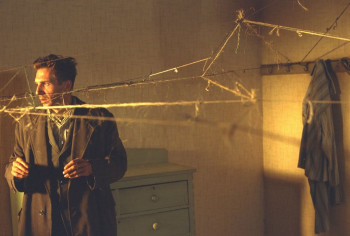My Father the Hero
It’s been a decade since I read Christopher Buckley’s Thank You for Smoking. I remember it as slight but laugh-out-loud funny, one of the few books I did not hesitate to recommend to anybody. The movie adaptation, written and directed by Jason Reitman, didn’t make me laugh out loud, but I was surprised at its modest depth – and the sources of that richness.

 After watching David Cronenberg’s Spider, I was acutely underwhelmed and disappointed. It could be that the movie’s impact on my first viewing – akin to dropping a light object onto a feather pillow – was a function of overblown expectations. Or it could be that the movie was designed to end with more of a whimper than a bang.
After watching David Cronenberg’s Spider, I was acutely underwhelmed and disappointed. It could be that the movie’s impact on my first viewing – akin to dropping a light object onto a feather pillow – was a function of overblown expectations. Or it could be that the movie was designed to end with more of a whimper than a bang.